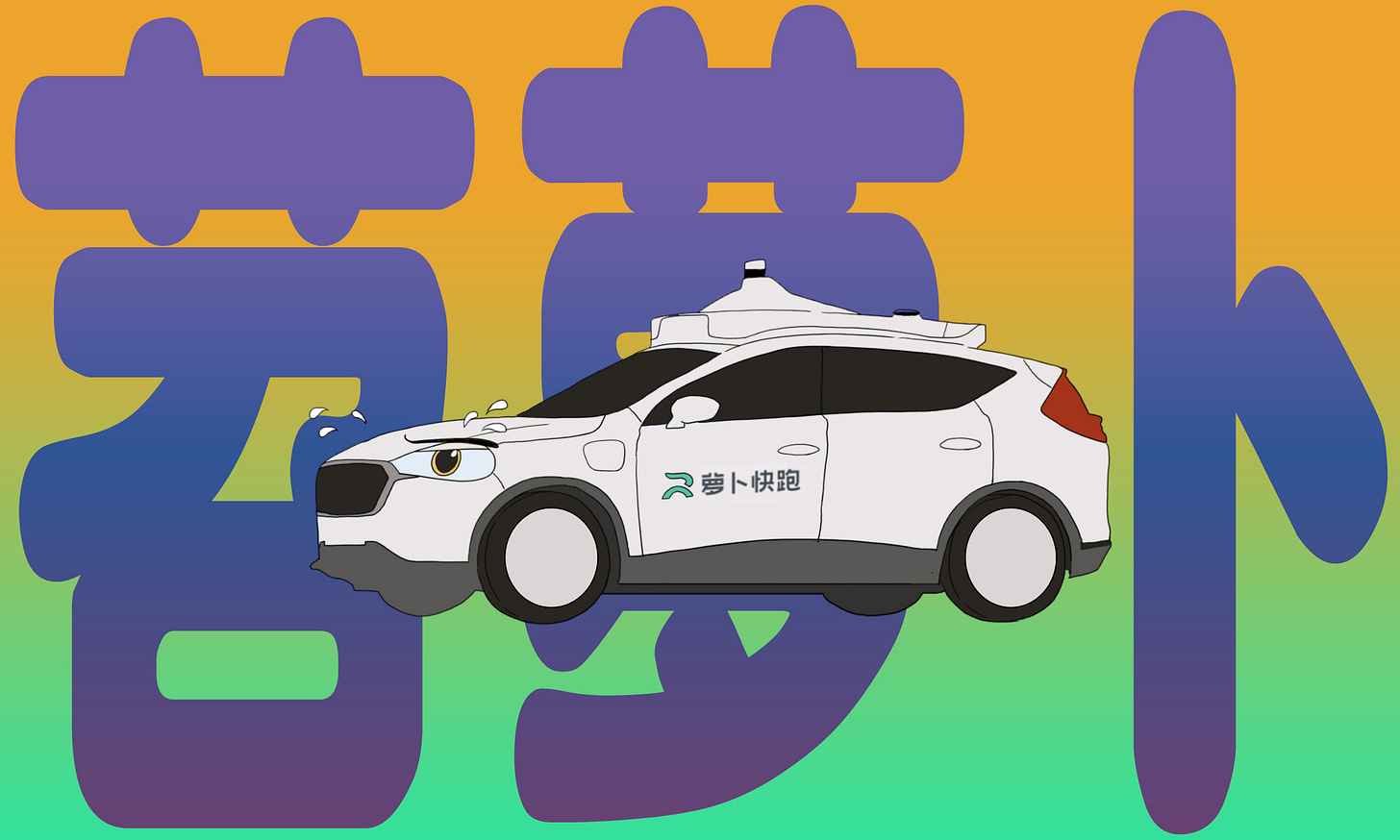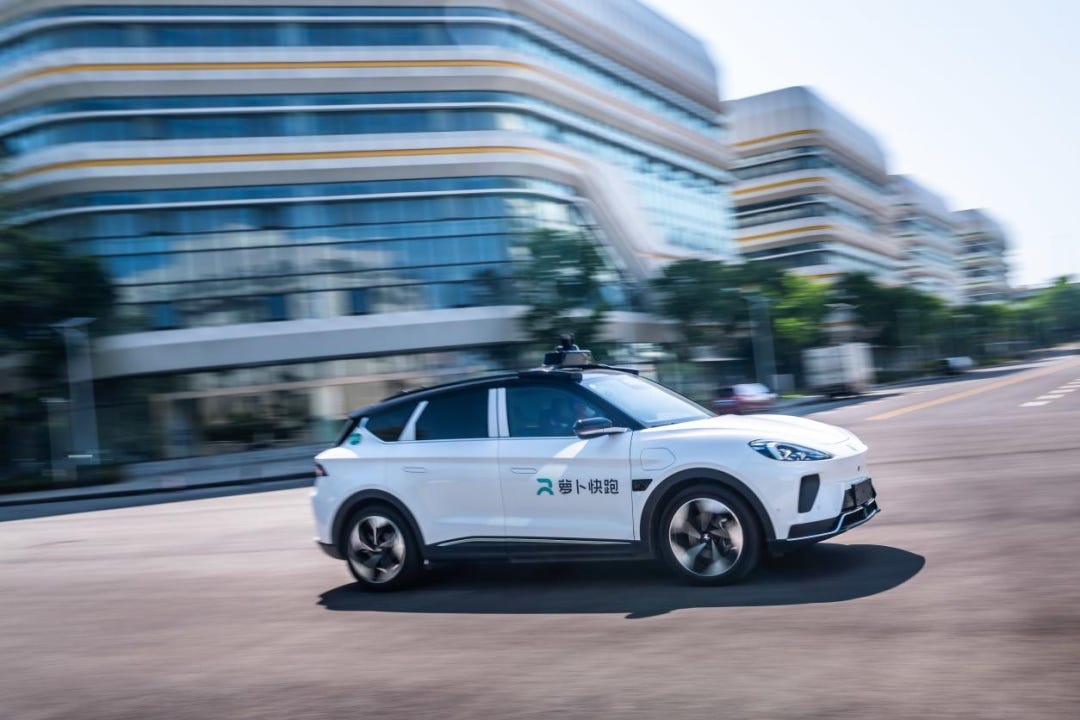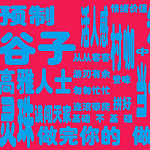Welcome to RealTime Mandarin—a multimedia resource to immerse you in the latest Chinese language trends, inspire you to practice and improve your Mandarin every week, and empower you to communicate with confidence.
Subscribe now to get the next issue straight to your inbox!
A fleet of more than 500 driverless taxis operated by Baidu in Wuhan, the capital of Hubei province, is quickly gaining attention and customers.
Operating under the brand name, Apollo Go (萝卜快跑), Baidu plans to put 1,000 driverless taxis on the roads of Wuhan by the end of 2024. It plans to replicate the experience in Wuhan to other cities including Shenzhen, Beijing, and Shanghai, where smaller scale trials are also taking place.
Wuhan is a city of 13.7 million people, and is positioning itself as China’s “first for autonomous driving” (自动驾驶第一城). The government has allowed Apollo Go driverless taxis to operate on 35 percent of the road network with the intention to expand further, it’s issued pilot licences for the commercialisation of intelligent and connected vehicles (ICVs), and it is the first city to open public test roads in the city centre.
Apollo Go cars can be hailed through an app or a WeChat mini program. Currently, the driverless cars can only pick up passengers in designated zones. When the car arrives at its pick-up address, the customer inputs the last four digits of their phone number on a key pad, the door atomically opens, and they are away!
Fares are cheaper than normal taxi fares too.
It’s also become popular for punters to take rides in the cars, and share images and experiences of their journeys on social media, and how that experience differs from the usual ride hailing experience:
"Self-driving taxis don't refuse rides, don't take detours, don't have unpleasant odours inside, and won't argue with customers.
You can also play your favourite songs and adjust the temperature to your comfort when you get in."
自动驾驶不拒载,不绕路,没气味,更不会和人吵架。上车还能放个自己喜欢的歌,调个自己舒服的温度。
Baidu has been investing heavily into developing driverless technology since 2013.
More than ten years on, the company may finally start to see a return on its investment. According an announcement made in May this year, Apollo Go will break even in Wuhan by the end of 2024, and become profitable by 2025. After that, the company says it intends to scale aggressively across China.
Baidu's stock price has risen by over 10% since making this announcement.
And as Baidu moves closer to realising a viable robotaxi business, the market will be huge. According to some analysts, by 2030, the total market size of shared mobility in China will reach 2.25 trillion yuan ($310 billion dollars), with the portion of autonomous vehicle services potentially accounting for 60% of that total, exceeding 1.3 trillion yuan ($180 billion dollars).
But, the arrival of Apollo Go on the streets of Wuhan is not without its problems, and there could be a bumpy ride ahead.
First, there are many taxi and ride hailing drivers worried about their jobs.
There are 64,000 of them in registered in Wuhan alone. Many of them are concerned about being replaced by driverless cars in the near future, even though the number of robotaxis on the roads there is still less than 1% of the total.
One common reference in discussions in the Chinese media is the parallels with the the arrival of Apollo Go and the Luddites (卢德派), who were members of a 19th-century movement of English textile workers who opposed the use of certain types of automated machinery replacing factory workers. In protest, the Luddites destroyed machines in organised raids.
In China as a whole, the number of registered ride-hailing drivers reached 6.6 million by the end of 2023. And by May of this year, that number surpassed 7 million for the first time.
That's a lot of drivers worried about being replaced by driverless cars, and a concern for government if they decide to take the Luddite approach.
A second concern is safety.
On July 7, an Apollo Go self-driving car collided with a pedestrian on the street who had tried to cross the road on a red light. The self-driving car had just started moving when the traffic signal turned green.
The car was moving slowly at the time, and the pedestrian did not sustain any injuries.
And finally, another concern is the limitations of the driverless technology.
These limitations have led to the invention of a new slang term for the cars which plays on the characters of the Chinese name of the Apollo Go brand:
Not long ago, there were many complaints about Apollo Go on Wuhan's message board, mainly about the slow speed and unexplained stops of the self-driving cars.
Complaints about "retarded robotaxis" in downtown Wuhan can be found not only on the city's message board but also on social networks like Xiaohongshu and Weibo.
不久前,武汉市的城市留言板上就出现了不少关于萝卜快跑的投诉,主要投诉萝卜快跑的无人驾驶车车速慢,以及无故停车。不仅是城市留言板,在小红书和微博等社交网络上,也能搜索到关于武汉市区「苕萝卜」的吐槽。[1]
We explain more about the phrase “retarded robotaxis” below.
So that's what we're exploring this week!
Favourite Five
1. 苕萝卜 sháo luó bo
retarded robotaxis
囿于无人驾驶车的性能,其在通过路口、窄路等复杂道路场景的效率还稍显不足,正因如此,有不少武汉人将萝卜快跑的无人驾驶车称作「苕萝卜」 - Due to the design of self-driving cars, they have limitations when it comes to navigating intersections, narrow roads, and other complex urban scenarios. Because of this, many people in Wuhan call Apollo Go self-driving taxis “Silly Carrots”. [1]
More: “Silly carrot” is the direct translations of this phrase. It’s a new slang term using the character for “Silly” (苕 sháo) in the Wuhan dialect. Learn more about this phrase and its translation in tomorrow's Sinica Phrase of the Week.
Note: this phrase is also written as 勺萝卜 (which sounds the same) in some social media posts, because the correct character is harder to find!
2. 砸饭碗 zá fàn wǎn
destroy livelihood
讨好乘客的同时,加剧拥堵、砸人饭碗的争议声也呼啸而来 - While Apollo Go is liked by many passengers, it faces the accusation of worsening congestion and destroying people's livelihoods. [4]
Related:
饭碗 fàn wǎn – livelihood
抢饭碗 qiǎng fàn wǎn – vie for someone's job
丢饭碗 diū fàn wǎn – lose one's job
吃不饱 chī bù bǎo – not have enough to eat; not get paid enough to make ends meet
3. 杯水车薪 bēi shuǐ chē xīn
trying to put a cart fire out with a cup of water; insufficient for the task at hand
“杯水车薪难以为继”,近日,武汉某家出租车公司在公告中说 - A public announcement by a taxi company in Wuhan reads “There's little we can do and the current business model has become unsustainable”. [2]
4. 屁股决定脑袋 pì gu jué dìng nǎo dai
where you sit decides what you think; your opinions are determined by your position
技术,人。你选谁?一个很经典的选法是:让屁股决定脑袋 - Which one would you choose, technology or human? A classic way to make the decision is to choose what's best for you. [3]
5. 一将功成万骨枯 yí jiàng gōng chéng wàn gǔ kū
a single general achieves fame on the rotting bones of ten thousand
时代的巨轮滚滚向前,但代价是一将功成万骨枯 - The giant wheel of the era rolls forward, but the advancement comes at the cost of countless individuals. [3]
More: The final line of the poem, In the Year of Yihai (乙亥岁) by Tang dynasty poet, Cáo Sōng 曹松.
Consuming the Conversation
Useful words
6. 窘境 jiǒng jìng
difficult situation
公司也提出五方面建议,反映了出租车公司当前的几大“窘境” - The company also proposed five suggestions, which reflect several major “difficult situations” faced by taxi companies. [2]
7. 活路 huó lù
livelihood
别把我最后的活路都卷没了 - Don’t take away my last means of making a living. [3]
8. 兜底 dōu dǐ
fall-back option
这些新注册的网约车司机里,有多少,是曾在其它各行各业里打拼,最后把开网约车作为兜底的人 - Out of the newly registered ride-hailing drivers, how many took up this job as a fall-back option after struggling in other industries? [3]
9. 工种 gōng zhǒng
types of work, job
最终,会创造出更多新的工种,新的产业,进而产生新的就业 - Ultimately, new jobs and industries will be created, leading to more employment opportunities. [3]
10. i人 i rén
introvert
完全不用担心司机的情绪和态度,感觉很私密,特别适合我这个‘i人’ - I don’t have to care about the driver’s feeling or attitude at all. It feels very private, so very suitable for an introvert like me. [3]
Note: one of the official top ten phrases of 2023.
11. 收割 shōu gē
harvest
他们担忧自己将被无人驾驶出租车替代,面临失业风险和收入困境,甚至认为这是资本的又一次“收割” - They fear that they will be replaced by robotaxis, losing their job and income, and some even believe this is how capitalists reap off workers. [4]
Three-character phrases
12. 黑科技 hēi kē jì
black technology; mind-boggling high-tech
不挑单、不拒载,更靠谱的自动出行黑科技 - Driverless technology that is non-discriminatory, taking all rides, and much more reliable. [1]
Note: Originally from Japanese Manga. Zoe discusses he differnce between this and “high tech” (高科技) in the Member Podcast.
13. 重灾区 zhòng zāi qū
worst-hit area















